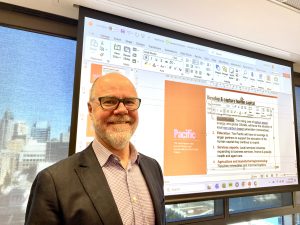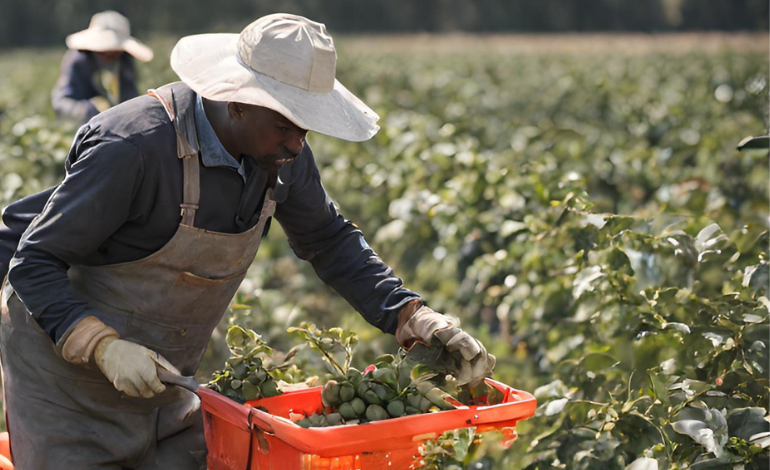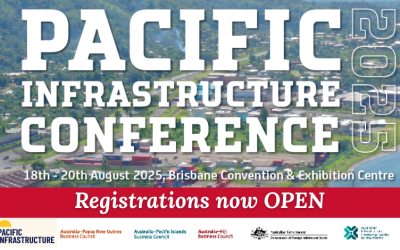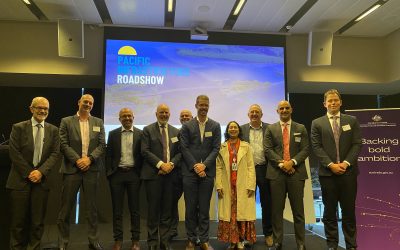 Westpac Director and Senior Economist Justin Smirk addressed the Executive Committee members of the Australia Fiji and Australia Pacific Islands Business Councils and invited guests in Sydney last month. The executive committee meetings were hosted at the Westpac offices.
Westpac Director and Senior Economist Justin Smirk addressed the Executive Committee members of the Australia Fiji and Australia Pacific Islands Business Councils and invited guests in Sydney last month. The executive committee meetings were hosted at the Westpac offices.
Here is a summary from his presentation on the Pacific’s economic outlook:
The economic outlook for the Pacific region highlights both significant opportunities and challenges as it navigates the global economic landscape post-COVID-19.
The Pacific’s economic recovery post-COVID has been slow, largely due to its dependence on tourism, which was severely impacted by global travel restrictions. However, the region is gradually rebounding, with tourism beginning to pick up, driven by cashed-up older generations seeking unique experiences and younger travellers looking for value. This resurgence is crucial for the economies of many Pacific islands, where tourism is a major source of income.
Another significant factor in the Pacific’s economic outlook is the ongoing reliance on remittances, particularly from countries like Australia and New Zealand. The tight labour market in Australia, exacerbated by an aging population and low productivity growth, continues to draw workers from the Pacific, boosting remittances back home. This influx of funds is vital for sustaining local economies, particularly in the smaller island nations where domestic job opportunities are limited.
The Pacific is also looking to expand its service exports beyond traditional sectors. There is potential growth in business services, finance, and possibly health and aged care, as these industries develop and integrate more with regional and global markets. However, the expansion of these services requires significant improvements in logistics and infrastructure, areas where the Pacific is still lagging behind.
Agriculture and manufacturing remain crucial sectors for the Pacific, but these industries face challenges such as high energy costs and logistical inefficiencies. The transition to renewable energy is essential for reducing operational costs and making these industries more competitive globally. Additionally, improving logistics, particularly in terms of transportation and supply chain management, will be key to unlocking further growth in these sectors.
The Pacific’s relationship with larger economies, especially Australia, plays a critical role in its economic future. The Vuvale Partnership, a key element in the economic relationship between Australia and the Pacific, particularly with Fiji, plays a significant role in shaping the region’s economic outlook. The partnership underscores Australia’s commitment to deeper engagement with Pacific nations through cooperation in areas such as security, health, education, and economic development.
As Australia adapts to long-term challenges such as climate change, aging population, and the shift to a renewable energy-based economy, the Pacific stands to benefit from closer economic integration. This includes potential partnerships in renewable energy projects, educational exchanges to develop human capital, and deeper engagement in regional trade.
While the Pacific faces significant challenges, particularly in adapting to global economic shifts and improving infrastructure, there are substantial opportunities for growth. The region’s strategic focus on tourism, remittances, service exports, and agriculture, combined with stronger ties with Australia, positions it for a more resilient and diversified economic future. Papua New Guinea and Fiji, while notable, are part of a broader regional dynamic where smaller island nations also have the potential to thrive with the right policies and investments.



